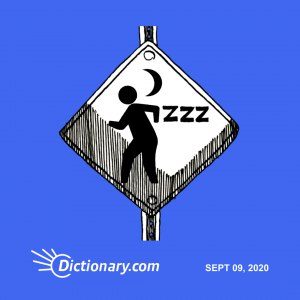Word of the Day
ineffable
adjective
incapable of being expressed or described in words; inexpressible.
More about ineffable
Ineffable ultimately comes from Latin ineffābilis “(of a word) unpronounceable,” and in Late Latin and Christian Latin “(of the divine name) that cannot or must not be spoken.” Ineffābilis is a compound of in-, the Latin negative prefix that is equivalent to English un– (as in unspoken), and the verb effārī “to speak, speak out, speak solemnly, declare” (itself a compound of the preposition and prefix ex, ex– “out, out of” and fārī “to speak”). Another English derivative, infant, comes from Latin infāns (inflectional stem infant-) “small child, infant,” literally “nonspeaking,” formed from the same prefix in– and fāns, the present participle of fārī. Ineffable entered English in the late 14th century.
how is ineffable used?
As a child, I loved reading the dictionary in search of the precise words for everything. Reading this poem, whose title is a Japanese word often translated as ‘‘sunshine filtering through leaves,’’ I felt that wonder again—how the language of poetry can move us closer to naming what is ineffable.
Again, I was listening very hard to jazz and hoping, one day, to translate it into language, and Shakespeare’s bawdiness became very important to me since bawdiness was one of the elements of jazz and revealed a tremendous, loving and realistic respect for the body, and that ineffable force which the body contains …
ineffable


vale
noun
the world, or mortal or earthly life: this vale of tears.
More about vale
Vale may be familiar to some readers from the woeful expression vale of tears, which casts the world as a place of sorrow and difficulty. Vale, “a valley, a low-lying piece of land usually having a brook,” comes from Middle English val, valle, vaile (and more variants), from Old French val, vau, vauls (and more variants), from Latin vallēs (inflectional stem valli-) “valley.” Vale in its literal sense as a geographical feature dates from the second half of the 14th century; the extended, figurative sense, “the world, mortal life, earthly existence,” dates from the first half of the 15th century.
how is vale used?
all he really wanted to do in company was to make jokes, to turn the world upside down and laugh at it, to enrich and enliven this vale of tears with a little fantasy.
As Keats witnessed more and more suffering—his brother Tom’s death; the infectious illnesses sweeping London—he connected his aesthetic vision to lived experience, and wrote in a letter that life is “a vale of soul-making”: “Do you not see how necessary a world of pains and troubles is to school an intelligence and make it a soul?”
vale


somnambulism
noun
sleepwalking.
More about somnambulism
Somnambulism, “sleepwalking,” comes via French somnambulisme from New Latin somnambulismus, a pretty transparent compound of the noun somnus “sleep” and the verb ambulāre “to walk, take a walk, stroll,” source of English amble. Somnus is the Latin result of the very common Proto-Indo-European root swep-, swop-, sup– “to sleep.” In Latin, the derivative noun swepnos (or swopnos) becomes sopnos, then somnus. The derivative noun supnos becomes hýpnos in Greek. Another derivative noun, swep–os-, becomes sopor– “sleep” in Latin (via swop–os-, then sopor-), as in English soporific “causing sleep.” Swepnos becomes swefn “sleep, dream” in Old English and sweven “dream, dream-vision” in Middle English. William Langland, usually considered to be the author of Piers Plowman, fell into a merveilouse swevene, a “curious dream,” one May morning in the Malvern Hills in Hereford and Worcestershire, England, and Piers Plowman is the narrative of his dream. Somnambulism entered English at the end of the 18th century.

how is somnambulism used?
Sleepwalking, or somnambulism, doesn’t always involve walking. A person is said to be sleepwalking if they are performing a complex task—talking, sitting up in bed, getting dressed—while in a state of deep sleep, according to the National Sleep Foundation.
Out and about, I spotted drowsy or dozing people everywhere; and I realized that a kind of mechanized mass somnambulism is an essential component of modern life ….
somnambulism





